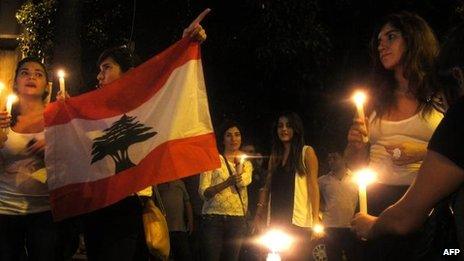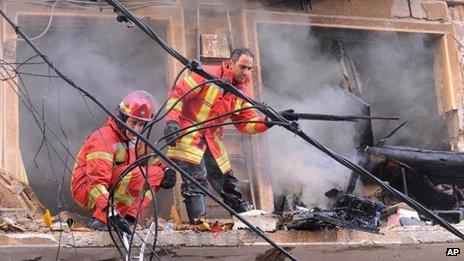Beirut blast stirs fears of return to conflict
- Published

Anti-Syrian politicians in Lebanon have accused Damascus of being behind a powerful car bomb that killed the intelligence chief of the Internal Security Forces, Brig-Gen Wissam al-Hassan. Although the Syrian government also condemned the blast, those comments have failed to convince many in Lebanon, as the BBC's Wyre Davies, in Beirut, explains.
The Lebanese in general, and the citizens of central Beirut in particular, have an almost legendary ability to bounce back, to recover from tragedy and turmoil.
This city that was engulfed for most of the 1980s by civil war, then latterly by a series of bombings and assassinations, had been relatively quiet over the last four years.
That calm has now been shattered in a devastating, direct manner and most people are pointing their accusatory fingers in one direction - directly east at the government of Syrian President Bashar al-Assad.
For the record, the government in Damascus and its allies here in Lebanon - including the Shia organisation, Hezbollah - have condemned the bombing.
However, few people are inclined to believe the denials of a government that has long meddled, interfered and at times dominated its much smaller neighbour.
Proxy war?
The overwhelming response on the streets of Beirut is of shock and anger. People here have absolutely no desire to return to inter-factional violence, although sectarian divisions are always close to the surface. Is Lebanon's intricate, but hitherto intact, jigsaw about to be smashed into pieces because of what is going on in Syria?
Less than 24 hours after the Ashrafiya bomb, its destabilising effect can already be seen. There were immediate rumours that the Prime Minister, Najib Mikati, would resign over his coalition's inability to respond in any meaningful way to the assassination of Gen Wissam al-Hassan.
Others urged him to stay, arguing that high-level resignations and political turmoil in Lebanon were precisely the aim of whoever killed General al-Hassan and at least seven others on Friday afternoon.

Beirut's comparative calm has been shattered by the first car bomb in four years
As angered as people here are by the blatant audacity of the first car bombing in Beirut in four years, an attack of this nature was perhaps, to be expected.
Syria's brutal civil is already being played out on the streets of Tripoli, the northern Lebanese city where Alawite and Sunni factions have fought fierce gun battles on at least two occasions this year. Syria's President Bashar al-Assad is an Alawite, while the country's majority Sunni community has been at the forefront of the revolt against his government.
One of Gen Hassan's most high-profile recent moves was the uncovering of an alleged plot that led to the arrest of a former minister, Michel Samaha. He was detained on charges of collaborating with members of the Syrian government to import explosives and launch attacks in Lebanon.
Fault lines
It would, so the argument goes, suit the purposes of the Assad government to "export" its civil war to Lebanon - a warning to those who are calling for Assad's removal that wider regional conflict would be the only outcome if the regime in Damascus was to fall.
Although historical precedents justify some of the accusations of Syrian involvement, it is still too early to definitively say who was responsible for the attack. It is also too early to say what the medium-term effect will be here.
Beirutis could indeed pick themselves up, dust themselves down and return their infuriating traffic jams, making money and trying to get on with life.
Or those fault lines could easily re-emerge: those who can afford it will leave the country, and this gloriously chaotic city could again be gripped by the kind of factional, sectarian strife they hoped was a thing of the past.
- Published20 October 2012
- Published19 October 2012
- Published22 September 2012